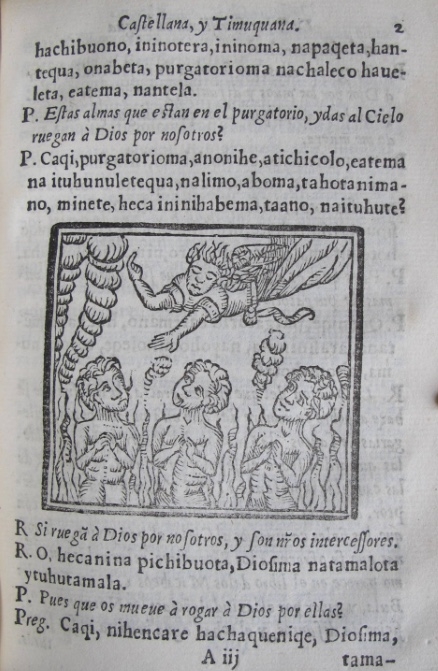
The Timucua were the Native American tribe living in northeast Florida and southeast Georgia at the time of first contact with Europeans. A few books written in the Timucuan language were created for the Spanish religious authorities as a way to convert the natives to Catholicism in their native language. Now a Florida professor has discovered one such book that had been unknown to researchers until now. Read the story below:
Timothy J. Johnson, Craig and Audrey Thorn Distinguished Professor of Religion at Flagler College, recently discovered a Spanish-Timucua book by the Franciscan Friar Francisco Pareja. The book, previously unknown to scholars, was published in Mexico in 1628.
Pareja and his anonymous Timucua co-editors, authored 130 folios with various woodcut images. The book is permanently housed in the Codrington Library of All Souls College in Oxford, England. The title of the work is, “IIII. parte de catechismo en lengua Timuquana y castellana: En que se trata el modo de oyr Missa, y sus ceremonias,” which translates in English to “Part Four of the Catechism in the Timucua and Castilian Languages, which treats the manner of listening to the Mass and its ceremonies.”
The rare find came when Johnson, on sabbatical for the Fall 2019 semester, had been researching Spanish-Timucua sermon stories from seventeenth century Florida and came across a reference to the book in the Codrington Library. In disbelief of what he was reading, he quickly notified the staff and requested images to verify his hunch. Once the existence of the book was verified, the library offered to make the entirety of the book available online, found here.
Says Johnson of the initial findings: “This discovery is what dreams are made of for people who work with historical documents. This book allows scholars to further explore a pivotal historical period in American history that has been neglected for far too long.”
The native language of most of Northern Florida in the Spanish colonial period was Timucua, and Franciscans began to study this language and teach native people reading and writing at the end of the sixteenth century. Two books published in Timucua in 1612 are the oldest written materials in an indigenous language of the present-day U.S.
The Timucua people were devastated by disease, war, and slavery, and though there are probably descendants, there is no modern Timucua tribe. Because the language is no longer spoken, linguists and historians have been eager to learn as much as possible about the language and its speakers through a small number of published religious materials in Timucua, including catechisms, a confessional, and a doctrina – an explanation of Christian doctrine.
According to Professor George Aaron Broadwell of the University of Florida, who is an expert in Timucua literature and language, “The discovery of this previously unknown book in Timucua is a very rare occurrence. The last discovery of a new item in this language happened in the nineteenth century.”
You can read the full story here: https://www.flagler.edu/campus-community/news/flagler-professor-discovers-unknown-spanish-timucua-book-while-on-sabbatical.php
